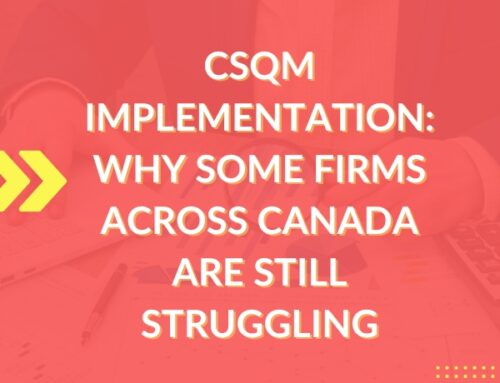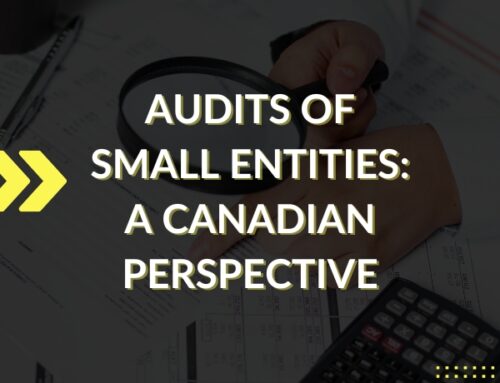As part of our professional development series for accountants, we are pleased to provide this outline of the Compilation Standard CSRS 4200 and its impacts.Canadian practitioners have long expressed a need for a explicit standards for compilation engagements that would better suit their needs by establishing specific criteria and giving direction on specific issues that have previously resulted in uncertainty and ambiguity when performing this type of work for clients.
In response, the Canadian Auditing and Assurance Standards Board (AASB) issued a new compilation engagement standard, Canadian Standard on Related Services 4200, Compilation Engagements, or CSRS 4200.
For the first time in thirty years, substantive changes, from reporting to documenting the basis of accounting, are being applied to compilation engagement criteria. These changes will impact practitioners, clients, and third-party readers of compiled financial statements.
CSRS 4200 was published in the CPA Canada Handbook on February 3, 2020, but will come into effect for fiscal periods ending on or after December 14, 2021. This deadline leaves practitioners with only a few months to get ready to implement the new standard. This article will examine the need for the changes included in CSRS 4200 and what those changes will mean for you and your clients.
What Is CSRS 4200?
CSRS 4200, replaces existing Section 9200, Compilation Engagements and AuG-5, Compilation Engagements – Financial Statement Disclosures. CSRS 4200 was included as part of the CPA Canada Handbook – Assurance.
Watch the video overview here.
Why Is CSRS 4200 Needed?
After extensive consultation, the AASB identified confusion among practitioners as to whether certain services fall within the scope of Section 9200.
The AASB also intended CSRS 4200 to address the gap between the assumption in Section 9200 that the compiled financial information is intended for management and how third parties, such as lenders, commonly use compiled financial information and data.
The AASB also saw a disparity between lenders’ perceptions of the scope of work performed by practitioners in compilation engagements and what was required by Section 9200.
This standard will ensure greater uniformity across practitioners in work done on compilation engagements, the knowledge of the customer, and the specifications of a compilation engagement.
CSRS 4200 will assist practitioners in clearly delineating the work they have done on financial statements from management’s ongoing responsibility for the contents of the financial information, resulting in more precise and relevant information for those using assembled financial statements.
When Will CSRS 4200 Take Effect?
CSRS 4200 applies to compiled financial information for periods ending on or after December 14, 2021, with earlier application permissible but not necessary.[OW1]
Overview Of CSRS 4200 Requirements
CSRS 4200 is a substantive change from Section 9200, so it is essential that practitioners fully understand the changes’ scope and their impact on clients.Here are some of the critical changes that you need to know about.
New PEG Forms
CSRS 4200 requires a different report that clearly explains management and practitioner obligations and the nature and extent of the engagement.The standard has also expanding the client acceptance and continuance, as well as the performance criteria, so it is important that the practitioners should make sure they are using the most up-to-date version of the PEG.
Communications To Clients
CSRS 4200 will require a new engagement letter format. Multiple services might be included in one engagement letter, or a practitioner may choose to issue individual engagement letters for each service. An illustrative example can be found here.
CSRS 4200 also requires a practitioner to inquire with management about the planned use of the gathered financial information, including if it is to be utilized by a third party. There is no obligation to monitor third-party use after the product is released.
Provincial Codes of Professional Conduct/Ethics do not require practitioners to act independently. Nevertheless, if in a given situation a reasonable observer would perceive a practitioner to be lacking independence, the Code mandates disclosure in the compilation engagement report.
Impact On Fees
The minimum work effort and documentation criteria are established by CSRS 4200. The new standard covers far fewer services than those under Section 9200. This means that some services a practitioner previously provided under Section 9200 may not be necessary under CSRS 4200.
A practitioner’s present practice methods will determine the impact on their working paper files, which frequently exceeds the minimal work effort and documentation required under current standards. However, the adoption of this new standard will almost certainly result in a change in the labour effort and documentation necessary for CSRS 4200 compliance, which could impact fees charged to the client.
Defining The Basis of Accounting
CSRS 4200 requires a note describing the basis of accounting applied to prepare the compiled information and is an integral part of that financial information. The purpose of the description of the basis of accounting is to help users understand how the compiled financial information was prepared.
Examples of bases of accounting commonly encountered in compilation engagements are:
- A cash basis – what has been in and out of the bank, with no time adjustments for accounts payable (AP) or accounts receivable (AR)
- A cash basis with selected accruals – primarily cash basis, but includes accruals and amortization estimates, as well as trade payables and receivables.
- Specified basis – An accounting basis defined in a shareholder or creditor agreement.
CSRS 4200 does not specify the basis of accounting used to prepare the compiled financial information; however, management must acknowledge this basis of accounting.
Representations From Management
This new standard improves communication between a practitioner and those entrusted with governance before and throughout the compilation engagement. However, it is critical to remember that the compilation engagement report required by CSRS 4200 must include a statement that management is accountable for the financial data collected, including the integrity and completeness of the underlying data used to assemble it and the choice of accounting basis.
Reporting
CSRS 4200 demands a new type of report that precisely explains the obligations of both management and the practitioner and the nature and extent of the engagement. It is crucial to highlight that financial information not covered by the standard will not have a practitioner’s communication included or attached to it.
Suppose the practitioner chooses to or is requested to issue a response based on such financial information. In that case, the only suitable format is a compilation engagement report, meaning all CSRS 4200 criteria will apply.
What Do You Need To Do Next?
With only months until CSRS 4200 comes into effect, practitioners must familiarize themselves with the new standard as soon as possible.
AJAG offers a comprehensive course on the new CSRS 4200 compilation standard as part of our professional development series. Click here to read the course overview and to register.
If you would like further insight into the reasoning behind the changes, we recommend you read the Basis for Conclusions issued by the AASB for CSRS 4200. This document offers context around the goal of the standard change and notes any areas of disagreement that have been explored and addressed
CSRS 4200 will bring substantive changes to compilation engagement criteria, disclosure and reporting.While CSRS 4200 will offer greater clarity, practitioners must learn about the changes in detail to proactively communicate those changes to their clients.






